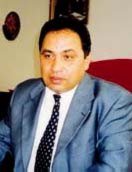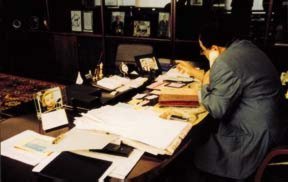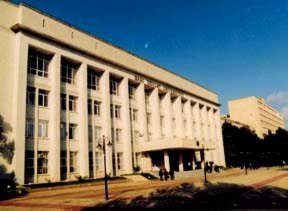|

Winter
1999 (7.4)
Page
77
Full Speed Ahead
Education
at Baku State University
by
Abel Maharramov, Rector
 Back in 1995, while
doing scientific research at the University of Minnesota-Duluth,
I made a presentation about Azerbaijan and showed slides of our
university. One of the photos showed a secretary typing on an
old classic typewriter. My speech was a scientific one, so I
hadn't really paid much attention to that photo, but one of the
professors interrupted me as he wanted a closer look at that
typewriter. He said that when he was a kid, his grandfather used
to have one of those typewriters. That's when I began to understand
just how far we were behind. Back in 1995, while
doing scientific research at the University of Minnesota-Duluth,
I made a presentation about Azerbaijan and showed slides of our
university. One of the photos showed a secretary typing on an
old classic typewriter. My speech was a scientific one, so I
hadn't really paid much attention to that photo, but one of the
professors interrupted me as he wanted a closer look at that
typewriter. He said that when he was a kid, his grandfather used
to have one of those typewriters. That's when I began to understand
just how far we were behind.
Education during the Soviet period can be likened to a ship.
Azerbaijan had its own little cabin on that sailing vessel. The
captains were all Russians; the ship's course was always determined
by Moscow. Our task was simply to follow it. Today Azerbaijan
has its own ship and Azerbaijanis are at the helm. We have just
embarked on a new journey.
Of course, we can't deny having benefited from being part of
the Soviet Union. Russian education was strong and had a great
history, producing some brilliant scientists. Thanks to the influence
of Russia, Azerbaijan's educational system also grew stronger,
enhancing the intellectual potential of the Republic.
Before that, Azerbaijan itself had a long history of educational
development. For example, there was a university in Tabriz as
far back as 600 years ago. Here in Baku, the birthplace of formal
education was at our university, which in 1999 celebrated its
80th Jubilee.
New Demands
Once Azerbaijan gained its independence, our educational system
came up against some serious challenges. For the first few years
after the collapse of the Soviet Union, we were in a very difficult
situation. We lost our lands. We failed to balance the diplomatic
relations between Azerbaijan and other countries. Here at the
university, it was so bad that there were no students who even
applied for post-graduate study despite the fact that Azerbaijanis
highly value education (1 out of every 1,000 has at least a master's
degree).
  Suddenly
people had no use for education as they thought it was more important
to go into business. After 1993, however, things began to stabilize
in Azerbaijan and there has been more interest in education. Suddenly
people had no use for education as they thought it was more important
to go into business. After 1993, however, things began to stabilize
in Azerbaijan and there has been more interest in education.
Back to the ship metaphor. The languages on that ship used to
be Russian and Azeri. We thought that the doors of that vesse
l- the Soviet Union - would never open to the world. We thought
it was sufficient for students to learn Russian.
Photo: In Rector Maharramov's
office. These days in official offices, you can witness a new
trend of putting photos of grandchildren and family members on
desks, a practice unheard of during Soviet times. Photo: Blair.
In the past, if someone had spoken Azeri at a national meeting
or conference, people would have wondered: "Why isn't he
making his speech in Russian?" It didn't matter that most
people in our country, especially those from rural areas, couldn't
speak Russian. Now the youth must know English. Why English?
Because the rest of the world isn't going to bother to learn
Azeri. We have to integrate ourselves into the larger picture.
Another serious problem related to education and which impacts
the university is the large number of refugees and internally
displaced persons (IDPs) in our country. Many of them are enrolled
in our university, which offers free instruction to them. But
the refugee problem impacts all aspects of our society-education,
production and economy.
  There's
also the question of Section 907, the restriction that the U.S.
Congress has placed on giving grants to our government. Back
in 1995, I myself felt its effects while doing research in Minnesota.
I had won a $15,000 grant from the U.S. National Science Foundation. There's
also the question of Section 907, the restriction that the U.S.
Congress has placed on giving grants to our government. Back
in 1995, I myself felt its effects while doing research in Minnesota.
I had won a $15,000 grant from the U.S. National Science Foundation.
Still to this day, four years later, I have yet to receive those
funds. Instead, I received a letter apologizing that the grant
could not be given to me because of Section 907. Out of the 15
republics that made up the Soviet Union, only scientists from
Azerbaijan were denied those grants. So this problem of Section
907 is very personal for me.
Photo: Baku State University
celebrated its 80th Jubilee this year. The university was established
the year prior to the Soviet takeover in 1920. This year under
the leadership of Rector Abel Maharramov, the university has
undertaken many repairs and renovations.
Recent Improvements
I've
been working as Rector of Baku State University since January
11, 1999. It's hard work trying to make up for all those "lost"
years. I start work each day at 9 a.m. and finish at midnight.
The most satisfying thing about my job is seeing progress-so
many of the plans that I wanted to implement are starting to
come to life now.
In these few months, we've totally renovated the classrooms-new
paint, new white boards with markers to replace black boards
with chalk, new construction, new bathrooms. We've gotten rid
of those old typewriters and installed computers instead-so far,
150 of them. We're trying to equip every department with its
own computer lab and to computerize the library as well. We're
connected to the Internet, and we hope that in the not-too-distant
future we will be able to use foreign libraries and that they
can benefit from our research as well.
A New Breed of
Student
Today's students are willing to take on more initiative and responsibility.
Recently, some of our students found a map of Azerbaijan on UNESCO's
Web site that was grossly inaccurate-it had excluded Karabakh
and all of the lands of Azerbaijan that are occupied by Armenia.
The students took it upon themselves to contact UNESCO, whose
officials apologized and corrected the information right away
so that the map identified Karabakh as being part of Azerbaijan.
This kind of student initiative would never have happened during
the Soviet period.
A student today may become a professor tomorrow. Our future presidents
and ministers are the youth of today. In this way, the future
development of our society depends on the intellectual level
of students. We have to convince the youth that they need to
develop. It's important for a student to learn something new
every day at the university. I'm always telling them: "Make
the most of each moment."
There are many other plans to be implemented here. To bring our
education up to world standards, we need a strong financial-technical
basis. Teachers' salaries need be higher. Conditions for students
must be improved. Textbooks that used to be in Russian need to
be published in our own language.
We're trying very hard to strengthen our international relations.
This year we concluded that every student who graduates must
be computer literate and able to speak at least one foreign language
fluently. Only in this way can we enhance the international image
of our university and strengthen its international relations.
Both teachers and students support this decision.
Steering the Boat
We want our university to be known on an international level.
If Azerbaijan itself is integrating into the world union, its
education and its science must do the same. Education must serve
as a lighthouse for the ship. This education can be carried out
in two directions: first, holding on to the valuable things of
the past; second, making bold, new steps forward to the future.
A country can only be judged according to its intellectual resources.
Natural resources are simply means, not goals. The intellectual
level of Azerbaijan contributes to the country's development
and prosperity. In all these processes, education must take the
lead. The university, its student population and teaching staff
serve as a mirror of Azerbaijani statehood. We understand this
responsibility. We must be out in front to lead society.
From Azerbaijan
International
(7.4) Winter 1999.
© Azerbaijan International 1999. All rights reserved.
Back to Index AI 7.4 (Winter
1999)
AI Home |
Magazine
Choice
| Topics
| Store
| Contact
us
|